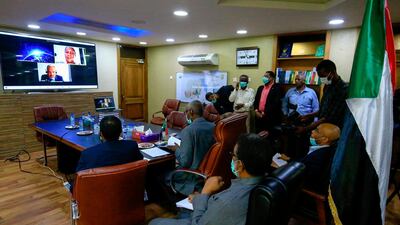Ethiopia does not have the “political will” to reach a deal on the operation of a massive Nile dam it is building and wants to act without heeding the interests of Egypt and fellow downstream nation Sudan, according to the Egyptian Irrigation Ministry.
A draft deal presented by Ethiopia during ongoing negotiations between the three countries is not legally or technically sound and does not ensure Egypt and Sudan's share of water during drought. It also grants Addis Ababa the right to change the rules governing the operation of the dam and the filling of its reservoir without prior consultations with Cairo and Khartoum, the ministry said.
“It is a clear attempt to impose a de facto situation on the two downstream nations because the Ethiopian position is founded on forcing Egypt and Sudan to either sign off on a document that takes them hostage to Ethiopia’s will or accept that Ethiopia takes unilateral actions like filling the reservoir without prior agreement from the downstream countries,” the ministry’s spokesman told reporters In Cairo on Saturday.
The latest talks on the long-running dispute began on June 9 and are being held just weeks before Ethiopia plans to start filling the dam’s reservoir. Sudan’s Irrigation Ministry said it was drafting a paper based on Egyptian and Ethiopian notes that would be presented when the negotiations resume on Monday.
Ethiopia’s Water and Energy ministry said the talks had achieved progress and would result in “finalising the process with a win-win outcome”. It provided no details.
Failure to reach an agreement is particularly worrisome as Addis Ababa has insisted it will start filling the dam next month regardless of the outcome, which would affect the amount of water reaching Sudan and Egypt.
The Egyptian Irrigation Ministry spokesman said Egypt had accepted a compromise “paper” submitted by Sudan as the basis for negotiations between the three nations. Ethiopia, however, countered with a proposal of its own on Thursday. The proposal was “worrisome” and “not legally or technically sound”, he said.
“The Ethiopian proposal was rejected by Egypt and Sudan. It reinforces the notion that Ethiopia lacks the political will to reach a fair deal on the dam and lays bare its intention to freely exploit transnational waters without regulations or care for the rights and interests of the downstream countries.”
Egyptian President Abdel Fattah El Sisi has said his country will never accept a de facto situation when it comes to its share of the Nile waters, describing it as an existential issue. A former general, he has not publicly spoken of military action to protect Egypt’s water, saying only that he prefers a negotiated solution. But Egypt will be pushed into a corner if Ethiopia starts filling the reservoir as planned.
Fuelling tensions, a top Ethiopian military commander was quoted by official media over the weekend as saying Egypt should be aware of his country’s military capabilities.
“Egyptians and the rest of the world know too well how we conduct war whenever it comes,” said deputy army chief Gen Birhanu Jula.
Any military action by Egypt would face a set of challenges like that the two countries do not share a border and that it would likely prove difficult to justify it as a legitimate act of self defence under international law.
However, Sudan, which neighbours Ethiopia, has dramatically shifted its stand on the dam issue, from years of support for Addis Ababa to embracing Egypt’s concerns.
Moreover, Egypt’s military has in recent years acquired cutting-edge hardware that allows it to conduct operations well beyond its borders, such as German submarines, French jet fighters and high seas troop carriers equipped with Russian-made assault helicopters.




The most populous Arab nation with 100 million people, Egypt depends on the Nile for more than 90 per cent of its water needs. It has been trying to persuade Ethiopia to agree to a gradual filling of the dam’s 74 billion cubic metre reservoir to reduce the impact on its water share.
It also wants Ethiopia to commit to releasing sufficient water in the case of drought and allow for joint committees to run the dam. A significantly reduced share of water could cost Egypt hundreds of thousands of jobs and threaten its food security as its population rapidly grows.
Ethiopia, for its part, says the hydroelectric dam it began building in 2011 is key to its development and that it was acting within its sovereign rights to build the dam and decide how much of the Nile’s water is released to Sudan and Egypt. It has accused Egypt of clinging to colonial-era agreements that gave Cairo the lion’s share of the Nile water and ignored the needs of the 10 other Nile basin countries.
The dam, to produce 6,000 megawatts on completion, is being built on the Blue Nile, which originates on the Ethiopian highlands and thunders down into eastern Sudan where it converges with the White Nile near Khartoum before flowing north through the deserts of northern Sudan, into Egypt and all the way to the Mediterranean.
















